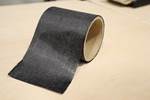MerConcept, Extracthive integrate rCF components into racing yacht construction
Development and integration of recycled composite ballast dorade vents for an IMOCA class yacht and other ongoing projects demonstrate a push for greater circularity in the marine industry.
MerConcept (Brittany), a French designer and builder of boats for ocean racing, and Extracthive (Laudun L'Ardoise, France), an SME specializing in the production of recycled carbon fibers (rCF), have announced an official partnership. Directly in line with each company’s mission to increase sustainability and reduce carbon footprint, the collaboration aims to develop the use of rCF in the next generation of ocean racing boats and, more generally, within the general shipbuilding sector.
MerConcept, headed by François Gabart, has established itself within the yachting industry. The company specializes in the design and construction of high-performance competition boats, designed for the most demanding events. Extracthive focuses its efforts on carbon fiber-reinforced polymer (CFRP) recycling, recovering post-production and post-consumer waste to produce high-performance rCF with reduced environmental impact. Its patented PHYre recycling technology uses a mixture of solvents at moderate temperatures to degrade the composite matrix and recover fibers with mechanical properties similar to those of virgin fibers, but with 10 times less greenhouse gas impact, according to the company.
As part of MerConcept and Extracthive’s collaboration, a series of ballast dorade vents have been developed, manufactured from 100% rCF. IMOCA monohulls feature water tanks, known as ballast tanks, to ensure balance when sailing by creating a righting moment when the boat is heeled over. These can be filled and emptied via vents in the ship’s deck. To prevent water infiltration from the outside while also enabling air to circulate, a dorade is installed. Its geometry must be simple to allow air to circulate through, rather than water. Other design criteria include minimizing weight and environmental impact. RCF, therefore, seemed ideally suited to this application.
The completed rCF dorade vent components have been integrated into an IMOCA class yacht taking part in the Vendée Globe offshore race that began in November. The yacht’s monohull will be subjected to particularly severe sailing conditions, making it an ideal playground for validating the robustness and reliability of rCF in high-performance applications.
Both companies note that this partnership is not limited to this project alone. MerConcept and Extracthive are already exploring the use of rCF in racing boats wherever technically feasible. The challenge is to increase the use of recycled materials while maintaining a high level of performance.
To guarantee a truly sustainable approach, MerConcept and Extracthive are also working together to recycle composite waste from boatyards, an issue that is said to be rarely addressed. The objective here is clear: to recover this waste and reuse it to supply MerConcept’s production with rCF, offering the same performance as virgin material.
Overall, the partners believe that recycling, and the introduction of rCF in ocean racing boats will demonstrate the relevance of these materials, even for the most demanding applications, while also paving the way for wider adoption in the nautical industry.
Related Content
-
PEEK vs. PEKK vs. PAEK and continuous compression molding
Suppliers of thermoplastics and carbon fiber chime in regarding PEEK vs. PEKK, and now PAEK, as well as in-situ consolidation — the supply chain for thermoplastic tape composites continues to evolve.
-
The potential for thermoplastic composite nacelles
Collins Aerospace draws on global team, decades of experience to demonstrate large, curved AFP and welded structures for the next generation of aircraft.
-
Bio-based acrylonitrile for carbon fiber manufacture
The quest for a sustainable source of acrylonitrile for carbon fiber manufacture has made the leap from the lab to the market.













.jpg;maxWidth=300;quality=90)




